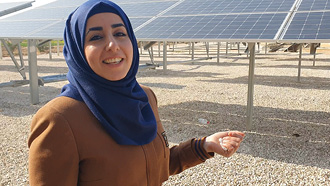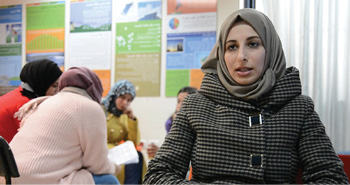


Struggling in Search of Employment
Suad Mansour is a 29-year-old engineer from the village of Beit Ijza in Ramallah who holds a bachelor’s degree in electronic engineering from Al-Quds University. She explains her long journey in search of employment.
“Since my graduation in 2013, I’ve been searching for jobs. But unfortunately, I have not been able to find a sustainable job in my field of study. Companies often prefer to employ male engineers. This has impeded my chances as a fresh graduate to gain practical experience that would enable me to gain the skills needed in the job market and demanded by employers. It is a vicious circle that has led me to experience four years of unemployment. As part of my training program with GROW, I have learned how to design solar systems of all sizes and have gotten to know the laws and regulations required to establish a solar system. I have been involved in practical work, particularly in topics related to electricity and solar panel installations, which is the type of experience that we never acquired at university. In addition, my participation in the energy audit training course and the exposure to qualified trainers with significant practical experience made me feel that I was gaining practical knowledge through their experience. I believe that the JDECO certificate and the seal that we obtained as part of successfully completing the renewable energy training program with GROW will open doors to new job opportunities.
“My message to renewable energy companies is to employ female engineers because they are highly qualified and professional. There is a misconception among employers that female engineers are unable to work in the field, and this is incorrect. When female engineers are provided with the necessary skills and opportunities, they can perform and excel in tasks that have been traditionally assigned to male engineers.
“I chose to be part of the first energy auditor cadre in the West Bank because it is a new and different field with promising job opportunities. It opened my eyes to new entrepreneurship ideas. I am now thinking of establishing my own company in energy auditing services. This is a long process, though, and to successfully establish such a business, I still need further specialized training and practical experience, as well as support in registering my company and launching the business.”

Venturing into the Field of Energy Efficiency
Amanee Al-Badawi, a 28-year old engineer, holds a bachelor’s degree in communication and electronic engineering from Polytechnic University and has been a registered member of the Engineers Association since 2016. She has been unemployed for around five years and describes her experience with GROW.
“One day I received an email from Engineers Association–Jerusalem Center (EAJC) encouraging female engineers to apply to participate in a solar energy training course and placement opportunity as part of a project called GROW. My desire to discover an emerging and promising sector prompted me to apply, and my family encouraged me a lot. Experience is crucial to enter the job market, but it isn’t easy to acquire as a fresh graduate. Participating in the GROW project was a golden opportunity, particularly for new graduates. GROW’s capacity-building support aims to link graduates with job market opportunities while they finish their university studies.
“I discovered a new field that I had not been aware of. I had not known about this entire sector and stakeholders that are specialized in energy auditing. As a communication and electronic engineer, all information acquired in PENRA’s energy audit training was new to me. But the trainers had the amazing ability to transfer knowledge with great passion and clarity. I have learned how to inspect sources of wasted energy, pinpoint where energy is used inefficiently, and identify measures to reduce energy consumption to the least possible level.
“Although energy auditing is a promising sector, it will be very difficult to find a job in this field if there are no regulations that require companies and factories to undertake energy auditing. I call on decision-makers to regulate this sector by drafting the needed legislation and regulations and provide adequate working conditions and decent salaries for this type of job, particularly for female engineers.
“As a woman endeavoring to engage in this domain, I consider it necessary also to encourage the emergence of specialized companies in energy auditing that support and enhance the capacities of females who work in this domain, whether via training sessions, studies, practical applications, or other similar measures.”

